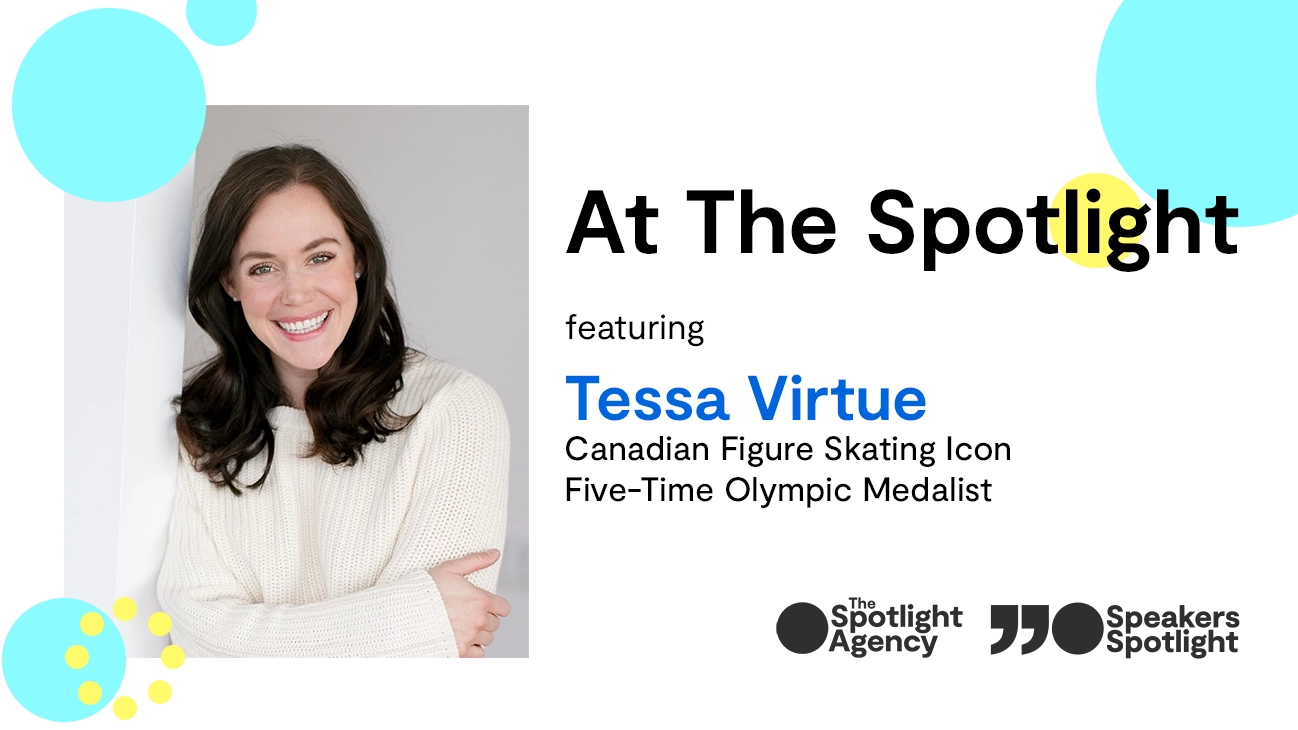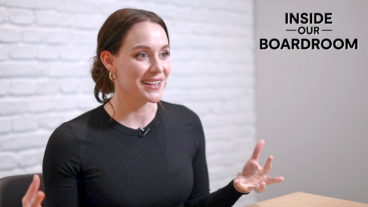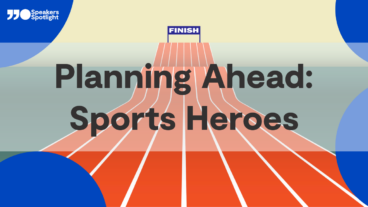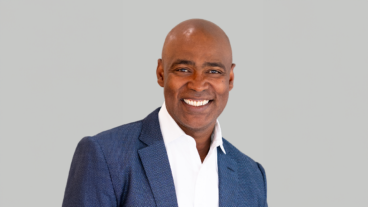Tessa Virtue, one of the most decorated figure skaters in Olympic history, has flourished under the spotlight on the world’s toughest rinks. Now, she’s taking on the toughest boardrooms as an executive advisor with Deloitte, where she works with the firm’s senior leaders and their clients to unlock their potential and empower sustained high performance. Drawing from her firsthand experience as an elite athlete and her academic background in positive psychology, Tessa is an invaluable resource in the art of balancing mental and physical excellence.
With performance continuing to be one of our most requested topics, we invited Tessa to join us as part of our client-exclusive event series, At The Spotlight. Who better to shed light on sustaining high performance than a three-time gold medalist? Especially one whose journey to the podium meant beating the odds each and every time.
Tessa captivated our audience by sharing snapshots of her remarkable career, while shedding light on the mental strategies she and her on-ice partner, Scott Moir, employed to ensure their mental performance matched their physical prowess — a key element to sustainable high performance.
Journey to the Olympics
Tessa has been ice dancing since she was seven, with Scott being her first and only skating partner. By 2004, they had won the Canadian junior national championship, claiming the ice dancing world junior title just two years later. After narrowly missing the 2006 Olympics, they promised each other to never be on the cusp again.
Winning Gold: Vancouver 2010
Leading up to the 2010 Olympics in Vancouver, Tessa and Scott had what appeared to be a near perfect season. But beneath the surface, they were lost in an exhausting cycle of training and performing. It wasn’t uncommon for us to spend 12-14 hours at the rink, Tessa said. Which is why one year before the 2010 Games, Tessa was on operating table with an injury caused by overuse.
Tessa and Scott entered the 2010 Olympics as the underdogs — unknown and without sponsors. Still injured, she vividly remembered counting the steps it took to get to the cafeteria because making that journey meant she’d be unable to practice that day.
Battling through pain and fear, Tessa credits their “naïve ambition” for the gold-medal win. They found their flow, achieving the unthinkable — winning gold at their first Olympics and becoming the youngest ice dance winners in Olympic history.
Losing Gold: Defending Olympic Champions
The Olympic high of that gold-medal win ended quickly. They were now defending champions and with that came an immense amount of pressure that was suffocating. Within months, Tessa was back on the operating table for the same injury. While they were better prepared for that, they were unprepared for the noise that now surrounded them.
The lead-up to the 2014 Olympics was fraught with doubt, compounded by a loss of faith in their coaching team. In retrospect, Tessa questioned their decision to stay as they spent that year essentially coaching themselves.
At the 2014 Games, ahead of a critical practice session where the judges were watching, Tessa told her coach exactly what she needed to hear to excel. Tell me to focus on Scott, she said. She knew zoning in on her partner would help calm her nerves to perform her best. Her coach looked at Tessa, held her shoulders, and said, see all those people in the crowd, all those judges, they expect you to fail. Tessa’s heart sank.
They went on to win silver. But, as Tessa said, “When you get silver, it doesn’t feel like you won second. It feels like you lost first.” That disheartening experience led to their temporary retirement.
Unlocking Excellence: Sustainable High Performance
After stepping away from competition, Tessa and Scott toured the world and for the first time, Tessa found joy in her sport. It led them to wonder — what if we trained differently? What if we had coaches who believed in us? What if we did things differently? It became difficult to ignore those “what ifs”.
“No one thought it was a good idea for us to return to competition,” Tessa said. “Not our parents, coaches, or even the federation. But the more no’s we heard, the more committed we became.”
Their new goal was to do things differently. Surrounding themselves with experts in nutrition, osteopathy, sports science, etc., they focused on strengthening both their bodies and minds. They treated mental performance with the same importance as physical preparation, embracing new mindsets to sustain excellence.
The Mindsets for Excellence
1. Stop Chasing Perfection, Strive for Excellence
Sport demands perfection, Tessa said, so we spent our lives fearing failure, fearing falling. We had to acknowledge that no skate would be perfect and that was ok. This took away the burden of perfection and allowed them to pursue excellence instead — an 8/10, consistently, every day. That’s where the magic happens.
We prioritized rest and recovery in our training schedule, Tessa said, only skating three hours per day. But in those three hours, they were more efficient and effective than ever before.
2. Get comfortable with the uncomfortable
You can’t make training comfortable, Tessa said, so we had to get comfortable with the uncomfortable. Inspired by astronaut Colonel Chris Hadfield’s approach to preparing for space missions, Tessa and Scott trained under tough conditions, deliberately making their practices harder than competitions. If they were sick, they saw it as an opportunity to prove they can skate their routine in any state. They wouldn’t flood the ice before their practice, instead choosing to train on choppy ice. They were afraid to fall, so they fell on purpose. This gritty preparation gave them the resilience and confidence to thrive in competition.
3. Pressure is a Privilege
The pressure of the 2018 Olympics was immense — they meant something to us, Tessa said. But by reframing pressure as a privilege, Tessa and Scott used the intense scrutiny of the 2018 Games to fuel their best performances. They simulated the intensity of the Olympics every day in training, so they would be ready for any situation — even being the flag bearers at the 2010 Opening Ceremonies.
Living the Dream: The 2018 Olympics
The 2018 Olympics felt like a dream. They delivered a career-defining performance, winning their second Olympic gold in ice dance. When the music ended, Tessa could see her whole career reflected in Scott’s eyes. It didn’t matter about the results, she said, what mattered is what they accomplished together in the leadup to this moment.
To find true joy in our sport, Tessa said, we knew it had to be about the process and not the moment. This time around, we had agency and autonomy in our training, our team was united in a shared purpose, we were accountable to each other, and we cultivated a culture of excellence in a toxic sport — we already won when we stepped on that ice.
Life After Sport
Tessa and Scott announced their retirement in 2019, and this time, they stayed retired. While her skating career came to a close, her career in pursuing excellence continued. Tessa has earned an MBA from the Smith School of Business and a Master of Applied Positive Psychology from the University of Pennsylvania.
It has been fascinating to take my lived perspective, Tessa said, and connect it to the data and science that supports it. As an executive advisor at Deloitte, Tessa now focuses her energy on helping others be their best, unlock their potential, and sustain excellence.
Hire Tessa Virtue to Speak at Your Event
In her fascinating and endearing presentations, Tessa customizes her content to share pertinent lessons on performance and sustaining excellence. Her presentations can be customized to focus on one or more of the following key learning outcomes, based on the needs of her audience:
- Leadership: Having been coached by many of the best in sport, and now helping to coach many of the best in business as an executive advisor at Deloitte, Tessa shares leadership approaches that inspire teams and drive results.
- Teamwork: As half of one of the world’s most successful duos, Tessa shares her lived experience on the importance of collaboration, communication, and commitment to ensure success.
- The power of purpose: How connecting to your “why” unlocks potential to help leaders and teams dig deep when it counts.
- Agility and resilience: How resilience contributes to success, and how to bolster skillsets to build resilience in the face of adversity.
- Managing burnout: Drawing from the energy management tactics of elite athletes, Tessa offers tools to combat burnout and improve work performance for both leaders and teams.
Tessa’s blend of world-class athletic experience, academic knowledge, and corporate insight makes her a highly sought-after conference speaker. Contact us to learn more about how to book Tessa Virtue for your next event.




